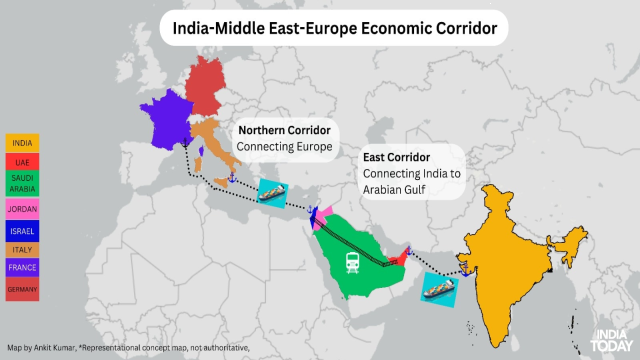September 12, 2023
India-Middle East-Europe Economic Corridor

Unveiling the India-Middle East-Europe Economic Corridor: A Transformative Connectivity Initiative
Introduction:
- Prime Minister Narendra Modi’s recent announcement at the G20 Leaders’ Summit has set the stage for a groundbreaking venture – the India-Middle East-Europe Economic Corridor.
- This ambitious project aims to revolutionize physical and digital connectivity across a vast expanse of the Eurasian subcontinent.
Jointly unveiled by PM Modi, US President Biden, Saudi Arabia’s Crown Prince Mohammed bin Salman Al Saud, and European Commission President Ursula von der Leyen during the G20 Summit in New Delhi, the corridor holds immense promise for enhancing connectivity and trade relations
Scope and Ideology of the Initiative:
- The India-Middle East-Europe Economic Corridor is a collaborative effort between the US and India, with a vision to establish comprehensive connectivity and infrastructure spanning India, Saudi Arabia, the UAE, Jordan, Israel, and the European Union. It stands as a sustainable alternative to existing global connectivity initiatives, embodying a forward-looking approach to economic integration.
Extension to Partnership for Global Infrastructure Investment (PGII):
- As a vital component of the broader Partnership for Global Infrastructure Investment (PGII), introduced by G7 countries, this corridor offers a sustainable counterpoint to the Belt and Road Initiative (BRI). By addressing global infrastructure needs, it seeks to provide a more equitable and environmentally conscious solution.
Mitigating Congestion and Enhancing Efficiency:
- One of the corridor’s key advantages lies in its potential to bypass the congested Suez Canal, presenting a more efficient route for cargo ships. This development is poised to streamline trade operations and reduce logistical challenges significantly.
Facilitating Trade and Economic Cooperation:
- A Memorandum of Understanding (MoU) signed by India, the US, UAE, Saudi Arabia, France, Germany, Italy, and the European Union Commission underscores the project’s commitment to enhancing connectivity, logistics, clean energy production, and economic cooperation. This signals a collective dedication to fostering mutual growth and prosperity.
Historical Significance and Revitalization:
- European Commission chief Ursula von der Leyen aptly described the corridor as “historic,” emphasizing the project’s transformative potential. By revitalizing India’s historical role as a crucial connector between Arabia and Europe, it resurrects ancient trade routes for a modern era.
Addressing Geopolitical Realities:
- This initiative mirrors emerging geopolitical shifts, showcasing deepening collaboration between India and the US in the Middle East. It also marks a significant step towards breaking Pakistan’s historical influence in the region and evolving relations with Iran.
Strengthening Arabian Engagement:
- The corridor represents a golden opportunity to fortify India’s strategic ties with the Arabian Peninsula, particularly with the United Arab Emirates and Saudi Arabia. This heightened engagement promises to bring about mutual benefits and further regional stability.
Fostering Intra-regional Connectivity:
- By fostering intra-regional connectivity, the corridor plays a pivotal role in the concept of “Infrastructure for peace,” potentially reducing tensions in the Arabian peninsula and contributing to overall regional stability.
Conclusion:
- The India-Middle East-Europe Economic Corridor holds tremendous promise as a transformative force in enhancing connectivity across the Eurasian subcontinent. Positioned as a viable alternative to China’s BRI, its success hinges on efficient implementation, coupled with sustainable financial and ecological practices.
With the active involvement of the European Union and prospects for collaboration in a Trans-African corridor, the initiative has far-reaching global implications, promising a future of enhanced connectivity, economic integration, and geopolitical influence. However, official timelines and funding details remain eagerly anticipated, as they will undoubtedly shape the trajectory of this monumental endeavor
January 30, 2025
January 20, 2025
January 14, 2025
